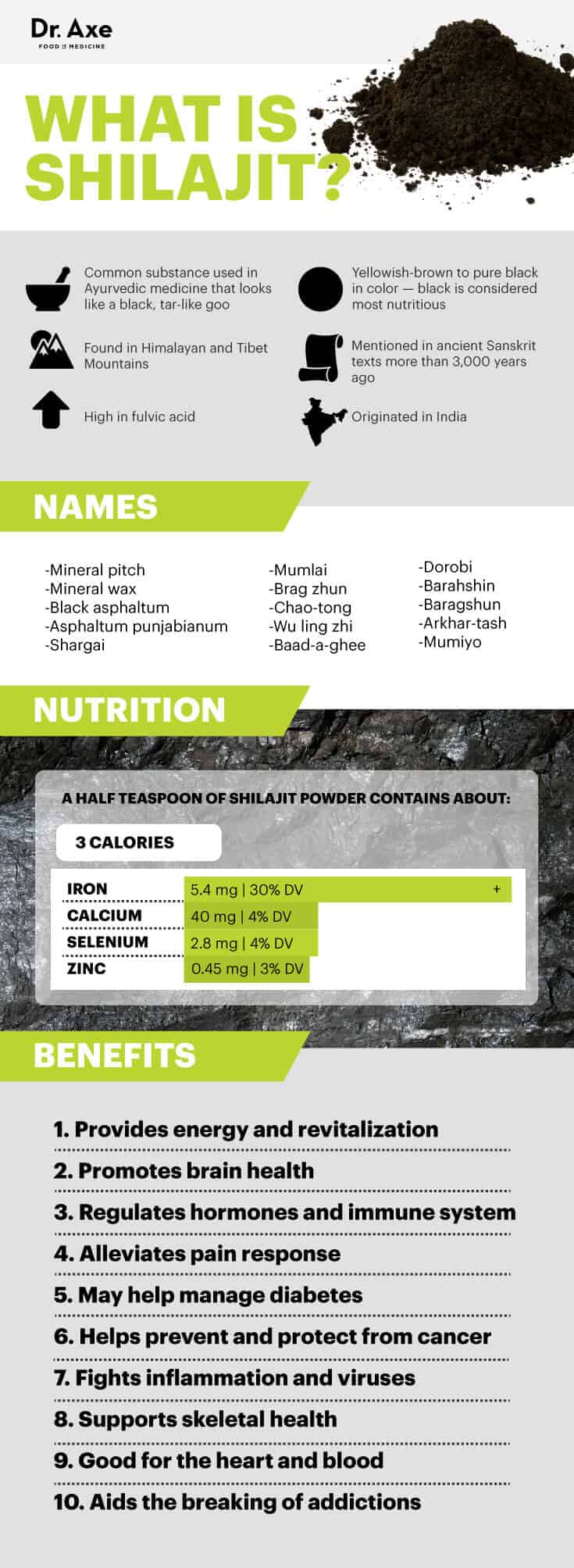Shilajit: The Ancient Brain-Boosting, Hormone-Regulating Medicinal Herb
It’s a common substance used in the ancient practice of Ayurvedic medicine, a 5,000-year-old method of disease prevention and treatment originating in India and still practiced in many Asian countries. Ayurvedic medicine is built on the concept that by keeping equilibrium in the body’s three “doshas,” one can live a long and healthy life without the use of prescription medications.
One reason shilajit is such an effective medicinal herb is due to its high fulvic acidcontent. Fulvic acid has many proven benefits, from improving gut health to keeping skin healthy. This ancient herb contains a huge percentage of fulvic acid and is one of the most common supplements used to increase your intake of this potent acid.
Known for thousands of years as a rejuvenator of the whole body, shilajit has garnered a fairly significant body of research for its impact on various body systems. So, before writing it off for its odd appearance, you should take a read into what it may be able to do for you.
Shilajit Benefits
1. Provides Energy and Revitalization
For millennia, practitioners of Ayurvedic medicine have prescribed shilajit to boost energy and revitalize the body. Because of the level of importance these natural doctors put on this supplement, the body of confirmed scientific research on it is growing steadily.
One way shilajit helps provide the body with energy is the way it increases the function of mitochondria within the body. Mitochondria are organelles that serve as the “power source” of cells in the body because they convert oxygen and nutrients into adenosine triphosphate (ATP), the substance that actually powers body cells. Shilajit encourages the function of mitochondria, helping them oxygenate more efficiently. (1) Not only does it help mitochondrial function on its own, but it’s been found to create a powerful effect on mitochondrial oxygenation when combined with supplemented CoQ10, an antioxidant naturally found in all human cells. (2)
As this substance helps increase the production of ATP, it increases overall energy and stamina. In fact, it’s commonly used to enhance athletic performance. (3) Chronic fatigue syndrome, a disorder classified by at least six months of inescapable fatigue, has been successfully treated with shilajit supplementation, also evidenced by the way it enhances mitochondrial function. (4)
In addition to mitochondrial efficacy, this herb revitalizes the body with its strong antioxidant properties. By fighting disease-causing free radicals, it repairs internal damage to the body caused by chemicals and other dangerous agents you’re exposed to, and it reduces the levels of fat in the blood. (5)
2. Promotes Brain Health
Shilajit seems to have a targeted mechanism for protecting brain cells in particular. Initial studies show it has “distinct and marked neuroprotective activity.” (6) In a 2013 study conducted by the Physiology Research Center at the Kerman University of Medical Sciences in Iran on the effects of shilajit on risk factors following a traumatic brain injury, researchers discovered that it has positive effects on the three most indicative factors of death following traumatic brain injury: brain edema, blood-brain barrier permeability and intracranial pressure. (7)
This incredible nutrient may also present a novel treatment option for patients suffering from mild cases of Alzheimer’s disease. The presence of fulvic acid and a treatment protocol including administration with B complex vitamins have shown promising results in pilot studies. (8)
In addition, shilajit exhibits anti-epileptic properties and potentially antipsychotic effects, as it adjusts GABA levels (a naturally occurring acid in the brain) to normal. (9)
3. Regulates Hormones and Immune System
Another important function of shilajit is the way it regulates various body systems, such as your immune system and the balance of hormones. Many researchers agree that it impacts so much of the body because of the way it helps these systems remain in equilibrium. (10)
In particular, shilajit affects reproductive hormone functions. In healthy males, supplementation increases blood testosterone and encourages the production of sperm. (11) When tested in pilot studies involving rats, it was also associated with ovulation in adult female rats, indicating that shilajit powder or resin may be an agent to consider for those struggling with infertility. (12)
4. Alleviates Pain Response
Ayurvedic medicine has long praised shilajit for its ability to reduce pain levels, but research has been limited until the last few years. Because of its interaction with GABA levels in the brain, this herb has a significant effect on orofacial pain (pain of the face, mouth or jaws), acting as a “sedating agent.” (13) A 2015 study on mice found it to relieve and lessen chronic pain over the course of time, dependent on the size of the dose. (14)
One feature that I’ll discuss more in depth in a moment is its interaction with medications. Regarding pain, shilajit interacts positively with morphine, minimizing the buildup of tolerance to morphine and, therefore, reducing the amount of this medication that one in serious pain would need to introduce into his or her system for effective pain relief. (15)
5. May Help Manage Diabetes
Those with diabetes may be interested to know that shilajit can help reduce blood glucose and lipid profiles in diabetes patients, especially when taken in conjunction with diabetes medications. (16, 17)
Shilajit is a main ingredient in a supplement known as D-400, Diabecon or GlucoCare. This supplement is designed to combine the most powerful Ayurvedic natural treatments into one pill. D-400 reduces blood glucose levels and shows potential to repair damage to the pancreas caused by diabetes. (18)

No comments:
Post a Comment